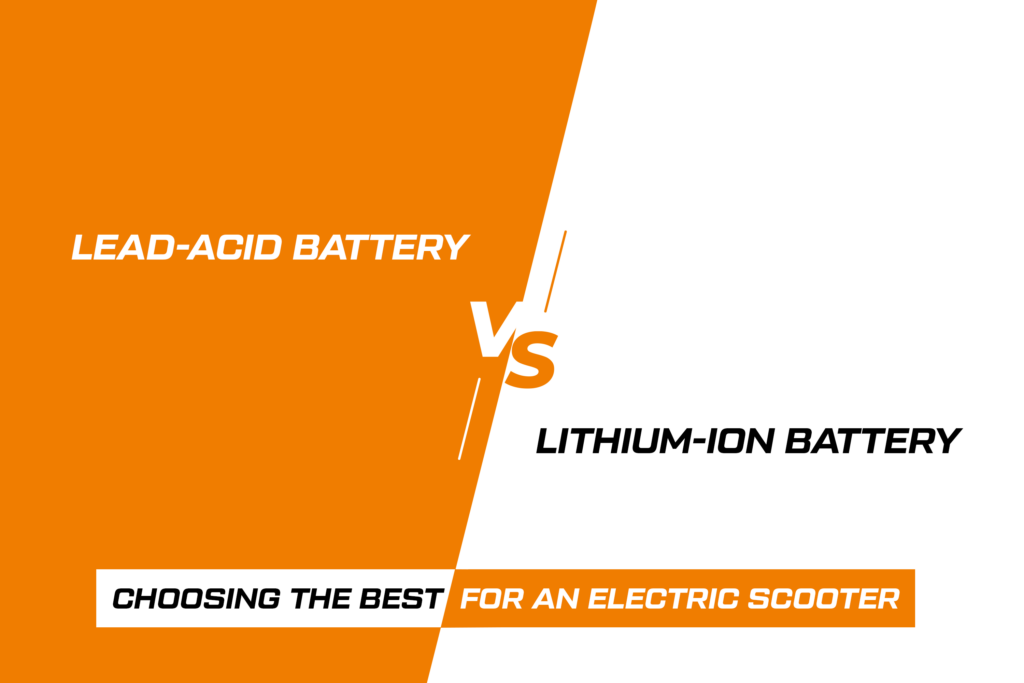Choosing the right battery technology for your electric scooter (EV scooter) can significantly impact your ride’s performance, range, and durability. As the heart of any Best electric scooter, understanding the nuances between Lead-acid Battery and Lithium-ion Battery technologies is crucial for anyone looking to invest in electric transport. This comprehensive guide will delve into the details, delivering unexpected insights and comparing these two prevalent electric scooter power solutions.
Which Is Better: a Lead-Acid Battery or a Lithium-Ion Battery for an Electric Scooter?
-
When considering the Best electric scooter (EV scooter) in India or anywhere across the globe, the Lead-acid Battery and the Lithium-ion Battery are the two primary e-scooter battery types on the market. Each has its benefits and drawbacks when used as an Electric Vehicle power source.
-
Lead-acid battery technology has been around for decades, offering a reliable and cost-effective power solution. They have a straightforward manufacturing process, resulting in lower electric scooter prices. However, their heavier weight, lower energy efficiency, and shorter lifespan often make them less ideal for the modern electric bike or scooter.
-
On the other hand, Lithium-ion Battery advantages include higher energy density, lighter weight, and longer life spans, making them the preferred choice for premium electric transport power cells. Although they come at a higher initial cost, their efficiency and durability often justify the investment.

What Is the Life of a Lithium-Ion Electric Scooter Battery?

Is there any advantage of using lead-acid batteries instead of lithium-ion ones in electric scooters?
Despite their drawbacks, lead-acid batteries offer significant advantages, particularly in cost and recyclability. Their established manufacturing and recycling practices make them an accessible and eco-friendly battery option for those on a tight budget. Lead-acid battery maintenance is also less nuanced, making them a viable choice for less technologically inclined users.
Do Lead-Acid Batteries Provide a Better Range Than Lithium-Ion Batteries in Electric Scooters?

How Does the Weight of Lead-Acid Batteries Compare to Lithium-Ion Batteries in Scooters?
The hefty weight of Lead-acid batteries compared to Lithium-ion batteries directly impacts the handling and performance of electric scooters. The lighter Lithium-ion batteries contribute to a more agile and energy-efficient ride, enhancing the overall user experience for the rider.
How Does the Weight of Lead-Acid Batteries Compare to Lithium-Ion Batteries in Scooters?
The dialogue around sustainable energy storage and eco-friendly battery options has pushed the electric scooter industry towards Lithium-ion technology. Not only do these batteries have a longer lifespan, but they also embody Lithium-ion battery advantages like reduced waste and lower environmental impact thanks to more efficient battery technology for mobility and better battery recycling practices.
Do Electric Scooters With Lithium-Ion Batteries Have a Longer Lifespan?
Lithium-ion batteries reign supreme for most electric scooter fans who value performance, eco-friendliness, and getting the most bang for their buck. These batteries last longer, weigh less, and power scooters better than their competition. Plus, charging them is a breeze. So, if you’re looking for a modern, high-performance EV scooter, lithium-ion is the clear choice.

Although lithium-ion reigns supreme for performance and eco-friendliness in electric scooters, lead-acid batteries remain a viable option. They offer a more attractive initial price point and require less maintenance which makes them a suitable choice for those prioritizing affordability and ease of upkeep over cutting-edge technology.

What Are the Environmental Impacts of Lead-Acid vs Lithium-Ion Batteries for E-scooters?
Electric scooters are becoming an increasingly attractive option for environmentally friendly individuals as lithium-ion battery technology keeps improving. These batteries not only have better performance and longer lifespans, but they are also safer and kinder to the environment. Plus, the growing importance of renewable energy storage suggests these lithium-ion batteries will play a major role in the future of electric vehicles, including scooters.
Forget fancy batteries, forget confusing choices. Lithium-ion batteries are the champs for electric scooters. They are strong, eco-friendly, and built to last. Other batteries might have their moments, but lithium-ion is the king. And guess what? These batteries are only getting better! So, if you want a top-notch scooter ride, lithium-ion is the clear winner.



